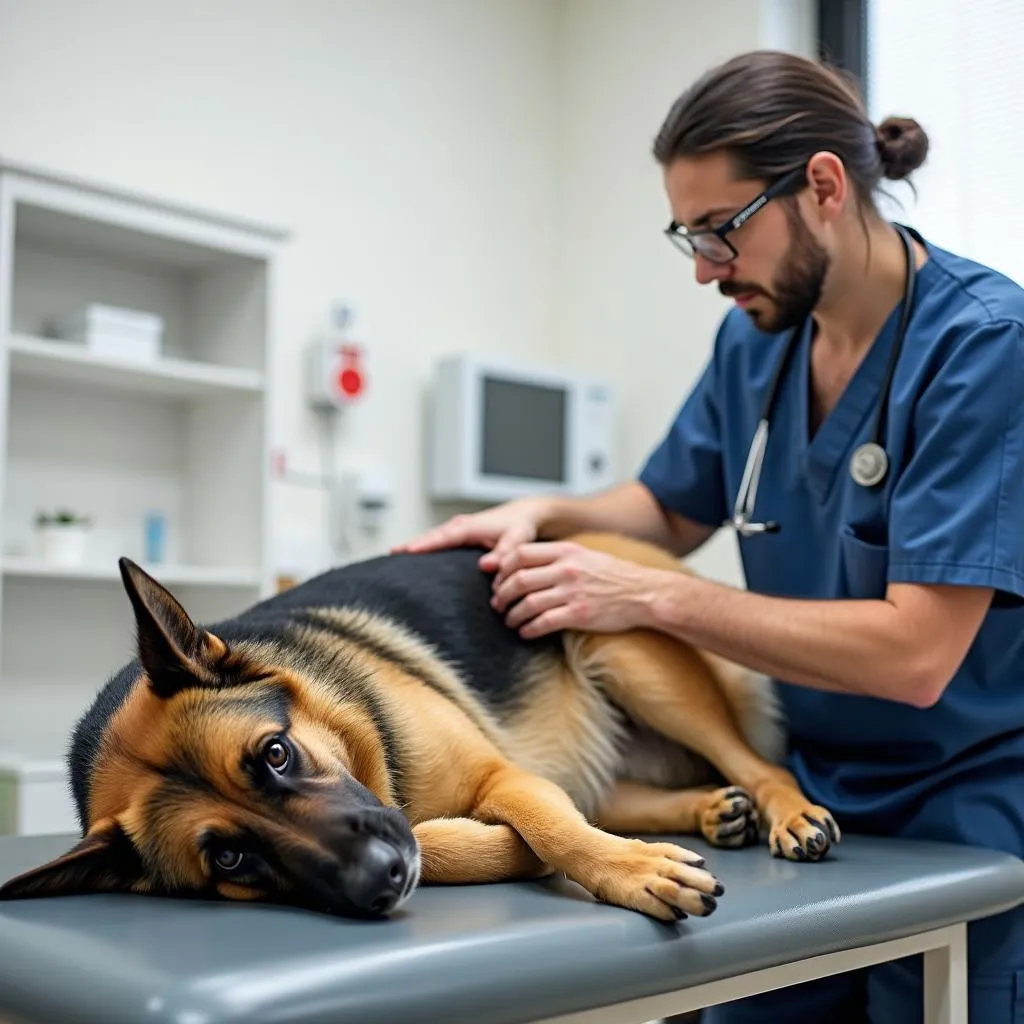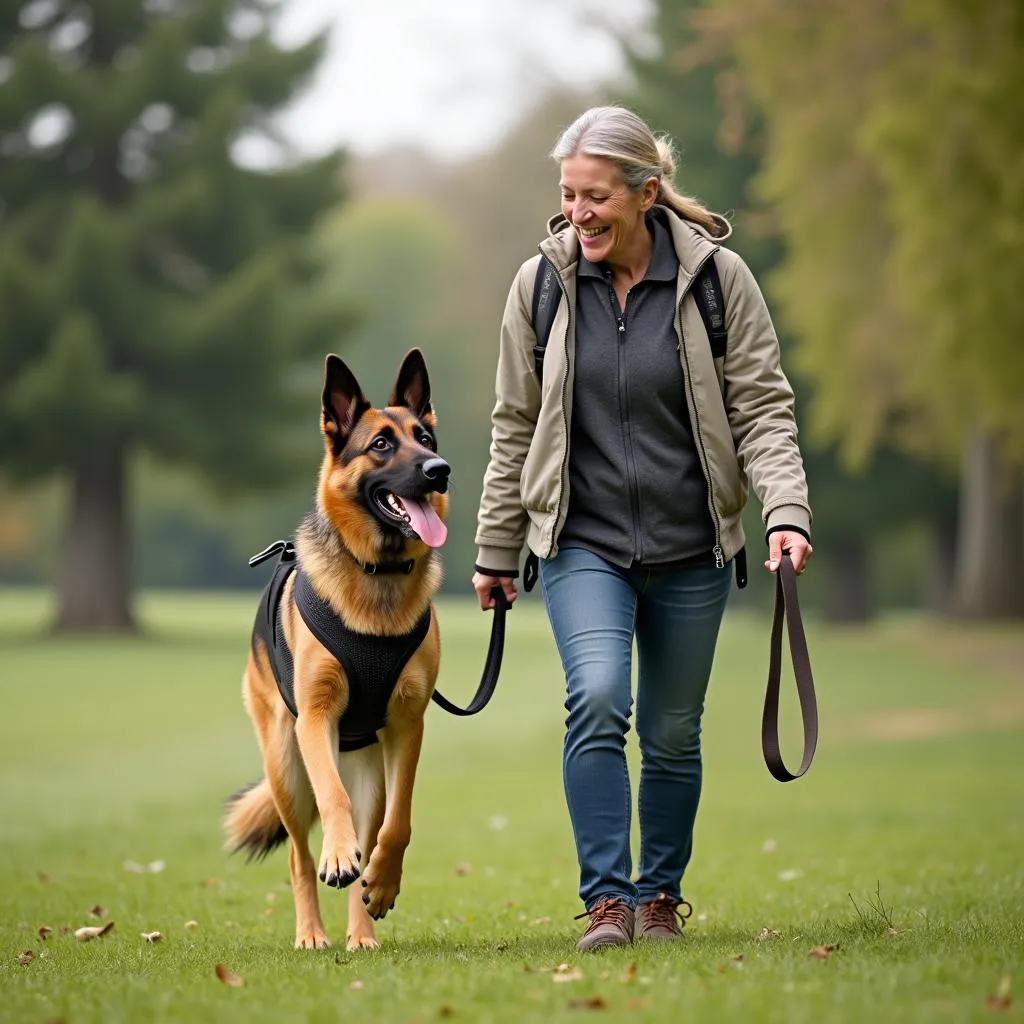“Cow hocked” – a term that might sound strange but holds crucial meaning for German Shepherd owners. It describes a condition where the dog’s hind legs are turned inward, resembling a cow’s legs. This can significantly impact their mobility and overall health.
What is Cow Hocked in German Shepherd Dogs?
Cow hocked German Shepherds, also known as “postural swayback,” have a distinctive inward angle in their hind legs. This angle puts stress on the joints and can lead to various health problems. Imagine a dog trying to walk on a narrow path with its legs constantly bumping into each other, that’s what it’s like for a cow hocked German Shepherd!
Causes of Cow Hocked German Shepherds
Several factors can contribute to this condition:
- Genetics: Cow hock is often inherited, so it’s crucial to understand your dog’s lineage and look for any history of this condition.
- Growth: Rapid growth during puppyhood can put stress on the joints and lead to misalignment.
- Nutrition: A diet deficient in calcium and other essential nutrients can weaken bones and predispose the dog to cow hocks.
- Exercise: Excessive exercise or strenuous activity before the dog’s bones are fully developed can strain the joints and contribute to this condition.
Signs of Cow Hocked German Shepherd Dogs
- Inward angling of hind legs: The most obvious sign is the inward bend of the hind legs.
- Stiffness and limping: Your dog might experience stiffness, especially after exercise, and may limp.
- Difficulty jumping: This can be a sign of pain and reduced mobility.
- Pain when touched: Gently pressing on the dog’s hock joint may cause pain.
What to Do if Your German Shepherd is Cow Hocked
If you suspect your German Shepherd is cow hocked, it’s crucial to seek veterinary advice. A veterinarian can diagnose the condition and recommend the best course of treatment.
“ Cow hocked German Shepherd dog being examined by a vet in a clinic“
Cow hocked German Shepherd dog being examined by a vet in a clinic“
Treatment Options for Cow Hocked German Shepherds
Treatment options depend on the severity of the condition and the age of the dog. Some possible treatments include:
- Physical therapy: This can help strengthen muscles and improve mobility.
- Weight management: Maintaining a healthy weight can reduce stress on the joints.
- Supplements: Glucosamine and chondroitin supplements can help support joint health.
- Surgery: In severe cases, surgery may be necessary to correct the angulation and reduce pain.
Preventing Cow Hocks in German Shepherd Dogs
- Choose a reputable breeder: Select a breeder who screens for cow hocks and other genetic conditions.
- Feed a balanced diet: Ensure your puppy receives a diet rich in calcium and other essential nutrients.
- Controlled exercise: Gradually introduce exercise to your puppy to avoid overstressing their joints.
- Regular checkups: Schedule regular veterinary checkups to monitor your dog’s growth and development.
Living with a Cow Hocked German Shepherd
“ Happy German Shepherd dog with cow hocks walking in the park with its owner“
Happy German Shepherd dog with cow hocks walking in the park with its owner“
Despite the challenges of cow hocks, your German Shepherd can still live a happy and fulfilling life. By providing the right care and attention, you can help them manage the condition and live their best lives.
Cow Hocks and Canine Karma
Some believe cow hocks are a sign of the dog’s past life actions. This belief, though not scientifically proven, reflects the deep connection many people have with their pets. It reminds us that even with physical challenges, our furry companions deserve love and understanding.
Contact Us
If you have further questions or need help with your dog’s health, please contact our team of experts at ilovemypet. We are here to assist you 24/7.
Leave a Reply
You must be logged in to post a comment.